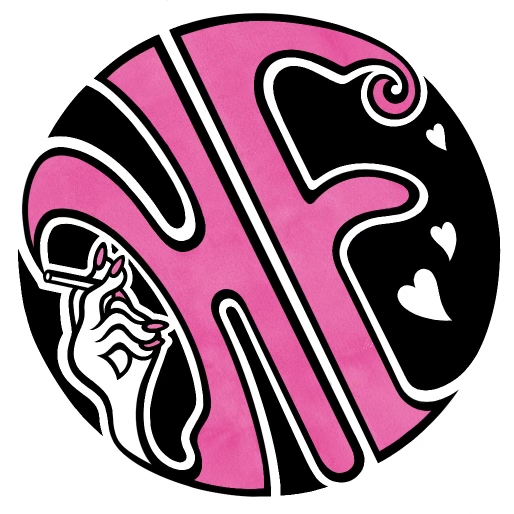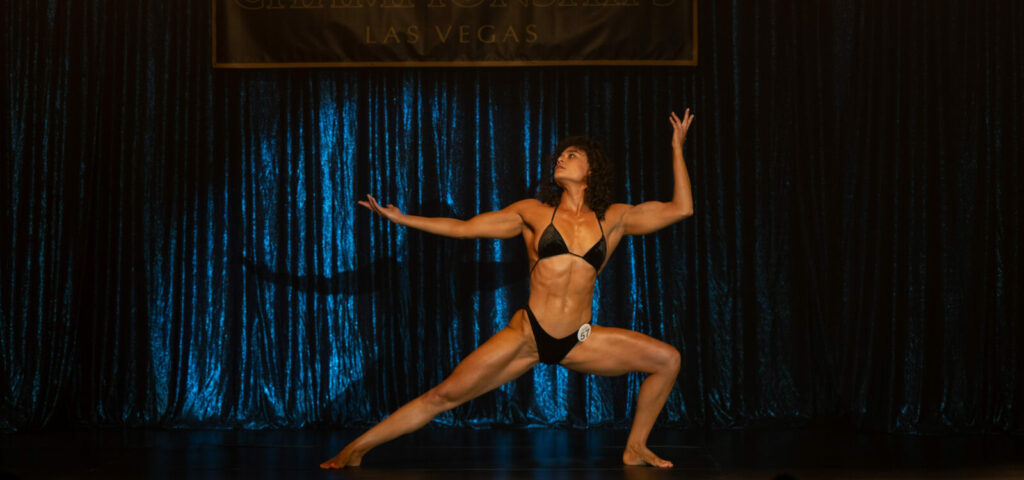Lou (Kristen Stewart) and Jackie’s (Katy O’Brian) first big fight is about a man. Just a few days before the two women met, Jackie—a burgeoning body builder stopping through town on the way to her first ever competition—fucked Lou’s brother-in-law, JJ (Dave Franco), in hopes of attaining a job. When Lou discovers this, she immediately plays the part of macho lover, calling mockingly out of her car window after Jackie as she pretends to leave in a huff.
Later that night, when the fight has simmered and Lou is sufficiently sheepish, she makes two sexual requests of Jackie as they stand at the bathroom sink. Firstly, Lou wants to see how Jackie masturbates—really masturbates, not just the shy, seductive gestures she first offers Lou in a coquettish attempt. But Lou also requests, with exploratory hands along Jackie’s body, “to stretch her out.” Before wetting two fingers to put inside Jackie, Lou mumbles, “I wanna see how far you can go.”
This sex scene is—though I blanch at the idea of talking about cinema and sex in the sterile, utilitarian terms that are en vogue at the moment—indeed deeply essential to the text of Love Lies Bleeding. It’s also, of course, not only worthwhile because it serves a purpose. Most importantly this moment is erotic and visceral on its own accord. And Lou’s physical, sexual stretching of Jackie—her referencing of her potential bodily elasticity—does not serve a tidily narrative purpose as much as it does a valuable allegorical one. This idea of a stretch is a sexy, squirmy breadcrumb that can be followed spiritually throughout the rest of Love Lies Bleeding.

In Becca Rothfeld’s New Yorker piece “All Good Sex is Body Horror”, she writes of director David Cronenberg’s films and his tendency to turn relatively “normal”, often upstanding humans into a monstrosity. Rothfeld suggests that these humans-turned-monsters can be read not just as horrifying, but also as appealing, cathartic, or even enviable in the ways they liberate themselves from social repression, and allow themselves to tap solely into their base desires; all id and no ego. And yet, Rothfeld also notes, we understand that this cinematic catharsis can be felt and understood without being taken literally. She writes: “An analogy is not an identity, and a metaphor is not a policy proposal.”
One wishes that we would not need to do something as obvious as defend art as a space for potent metaphor, allegory, and interpretive suggestion as Rothfeld so tidily lays out in her piece. But it’s naive to not acknowledge that we currently live in a world where online sex scene discourse rears its repetitive, engagement-farming head frequently, and representation of any marginalized group is often demanded to be squeaky clean because of a tendency toward automatic literalization and a demand for monolithic, clean-cut lived experience.
Fortunately, Love Lies Bleeding takes Rothfeld’s encouragement to make some allegorical and representational messes—especially when it comes to sex—to heart. Lou and Jackie frequently dance a line as lesbians between deliciously stereotyped—Jackie moved in the day she met Lou, who up until then lived on her own with her cat, and Lou essentially only has passions surrounding her new girlfriend, including injecting her with steroids, separating her proteinaceous egg whites from her yolks as she bulks, and eating out her new girlfriend or getting eaten out by her new girlfriend—and oozing possessive toxicity.
Throughout the film, Lou and Jackie are constantly stretching for one another, as Lou hints at when they fuck. The two women prove their love for each other by pushing boundaries—physical, mental, and existential—as testament to their overwhelming desire for one another. In a rather Cronenberg-ian move, a combination of the steroids she’s taking and her devastating love for Lou causes Jackie to be able to grow to literal giantess levels in moments of territoriality (or, even more delightfully, lustfulness!) toward her lover. Jackie stretches so far for Lou that her body is literally capable of expanding endlessly.

But most of Lou and Jackie’s existential stretching comes in the form of their increasing dedication to literally kill for one another—be it for revenge, protection, jealousy, or, at times, a combination of the three.
With the notion of cinematic allegory in mind—metaphors and analogies instead of policy proposals and squeaky clean lesbians—we can begin to see the various kills and acts of stretching enacted by both Lou and Jackie in Love Lies Bleeding as cathartic, satisfying, and even erotic.
The “easiest” of their kills are all members of Lou’s family — her abusive brother-in-law, her small-scale crime lord father. Jackie stretches for Lou by smashing JJ’s face into a table, and by eventually growing to giantess form to pin Lou’s father to the ground as Lou attempts to kill him.
It’s important, at least to me, that these women are killing for each other instead of dying for one another. “I would die for you,” is based on the cerebral and the tragic—all feelings based, none of the body. The promise of dying for someone implies that the memory of your lover would sustain you. But what if it’s simply sexier to kill? Or, if not sexier, what if Jackie and Lou (and by extension lesbians everywhere) are of more use here on this earth, propagating desire, love, and care, than they are as dead lesbians who can be daydreamed about tragically like fallen soldiers?
Someone killing for you implies that they get to stay alive, coming to you with bloody and bruised hands, able to hold you, to fuck you, again. If you were to die, who would separate her egg yolks from the white, eat her out, give her her medicine? As Ariana Martinez writes in her Polyester piece, “Swelling Chests and Shameless Sex: Love Lies Bleeding and Evoking Cronenberg”, Lou and Jackie’s “story exhibits that if pain is weakness leaving the body, then orgasms are the fruitful successes of shared labour.” Being alive and in their bodies—where they can watch out for each other, care for each other, and come for each other, are where they exist best.
The potential moral tidiness of their possessive killing streak falters around the matter of Daisy (Anna Baryshnikov). Daisy is a small town femme with stringy blonde hair and a closet of skimpy cotton tees and short denim. She’s yearned for Lou for what seems to be a long time, in the only way really she knows how; sad images of them kissing and dancing at the local dive or diner. When Daisy finds an in by blackmailing Lou and Jackie with a wrench in their alibi on the night of JJ’s murder, she uses it to manipulate Lou into having sex with her.

While Daisy is not particularly bright, or particularly nice (a personally cherished form lesbian representation!), she also lacks the obviously atrocious abusive coldheartedness of JJ and Lou’s father, and is not as obviously deserving of death. And yet Daisy is rather brutally killed not once, but twice. But the moral shakiness around Daisy is in fact the key to Love Lies Bleeding’s freedom to focus on the metaphorical mess of Jackie and Lou’s desire, to see how far they can each go. With Daisy, members of Jackie and Lou’s “body counts” can take on a fluid meaning, sometimes both literal and figurative, murdered and fucked.
The first time Daisy is killed is by Jackie—shot in the head on Lou’s porch and falling into her own margarita puke, victim of a jealous murder orchestrated partially by Lou’s father. But the second time Daisy is killed (this time by Lou) is where all matters of allegory, sexuality, and stretching in Love Lies Bleeding reach perfect harmony.
When Daisy is killed in the final moments of the film, Love Lies Bleeding first blows kisses to the great lesbian cinematic figures who have come before it. Finally freed of Lou’s family, Jackie and Lou rip through blue-lit Desert Hearts backdrops in their crappy pick-up truck. The cherry red of the brake lights against the blue of their bumper tells us that we are in Thelma and Louise’s world, two women agreeing with each other that they want to “just keep going”.
And then Daisy’s presumably dead body stirs in the back of Lou and Jackie’s pick-up truck; a ghost, a zombie, that ex that you and your girlfriend absolutely do not fucking talk about. Lou glances at her sleeping girlfriend before hauling into the bed of the truck and unceremoniously choking Daisy to death and dragging her out into the brush.
Lou is committing murder, sure, but much like Jackie literally grows dozens of feet tall in a representation of the way Lou makes her feel endlessly stretchable, Lou’s hands-on murdering of an ex-bed partner feels, at this point, equivalent to quietly deleting an old hook-up’s number or pretending to look the other way when she sees her on the street.
Love Lies Bleeding creates these massive stakes—these big stretches—because that’s how early love and early sex inevitably ends up feeling. It’s life or death, you’re everything or you’re nothing. To love and to be loved is not to be perfect. It is not to be endlessly kind and gentle. It is not to remain pristine. You do not have to be all of these things always to find and sustain love. To love is instead to stretch— to kill what does not serve you, to kill what does not serve your lover, to grow many many feet tall. To be loved is to fight and then delight in being touched against the bathroom sink. To be asked by someone who means it and to actually seriously consider for once how far, exactly, you can go.



